Mohammad Ayaz Abdal
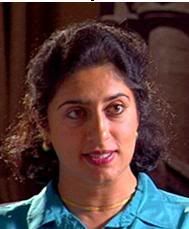 In the land of great Pharaohs, under the shadow of the mighty pyramids, there lives a woman who seems to know every intricate details of every conspiracy that went on in the ruins of the magnificent palaces. You will see her on your TV screen, if you are a history buff, detailing the customs and routines of Ancient Egypt’s daily life … and death. Right from their traditions and scandals, she will explain the fine details of mummy making. She has always intrigued me. Her accent was non Arabic. So I searched for information about her and, to my amazement, I found that she is a Pakistani and from Lahore.
In the land of great Pharaohs, under the shadow of the mighty pyramids, there lives a woman who seems to know every intricate details of every conspiracy that went on in the ruins of the magnificent palaces. You will see her on your TV screen, if you are a history buff, detailing the customs and routines of Ancient Egypt’s daily life … and death. Right from their traditions and scandals, she will explain the fine details of mummy making. She has always intrigued me. Her accent was non Arabic. So I searched for information about her and, to my amazement, I found that she is a Pakistani and from Lahore.
Dr. Salima Ikram is an expert of mummification or Egyptian funerary archaeology; she can speak on hours about the ancient Egyptian techniques of mummifying animals and humans. In her own words:
“It fascinates me as one learns not only of how they died and were buried, but also of how they lived and what they valued in their lifeâ€
Her command over her subject is fascinating. It is safe to say that if we have to somehow recreate this ancient civilization today, she would be one of the major architects.
I emailed her on behalf of ATP and she very graciously agreed to take time out of her busy schedule to talk to us. And when I am saying busy schedule, in her own words:
I am working on 12 excavations with other scholars and my own project that I direct in the North Kharga Oasis, as well as on 2 books. My most recent book, Ancient Egypt: An Introduction just came out today.
In addition she also teaches Egyptology and archaeology at the American University in Cairo. She is the correspondent for KMT, a popular Egyptological journal, a frequent contributor to Egypt Today, and the co-director of the North Kharga Oasis Survey. At the American University of Cairo, Ikram also teaches courses on ancient Egyptian history, culture and society, food and drink, and art and architecture, as well as archaeological methods and theories. “Ancient Egypt is part of our common heritage,” she says. “We need to present Egyptian history and culture in a way that is easily understandable to everyone, focusing on their humanity.”
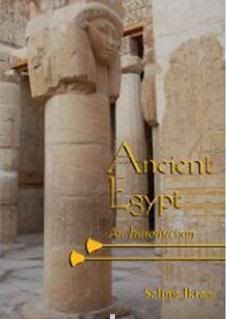 I asked her about her childhood and how she became interested in this subject.
I asked her about her childhood and how she became interested in this subject.
I was born in Lahore, in the shadow of the Badshahi Mosque. I became interested in ancient Egypt when my parents gave the Time-Life book of Ancient Egypt as an 8th Birthday present. When I was 9 I visited Egypt. I fell in love with the place and the subject after I saw the twin statues of Rahotep and Nofret, and Tutankhamun’s treasures. As my father was working on the Egyptian economy we visited Egypt frequently and I got to see more and more of the country and its treasures. When I chose to follow the path of Egyptology, my parents were very concerned as they feared that I would not be employed ever. However, they were delighted when I found a job.
She pursued Egyptology and Archaeology at Bryn Mawr College, Pennsylvania, USA, where she earned an A.B. in Classical and Near Eastern Archaeology and History. She went on to earn her M.Phil. and Ph.D. from Cambridge University in Egyptology and Museum Studies. During the course of her Ph.D. she also trained in faunal analysis.
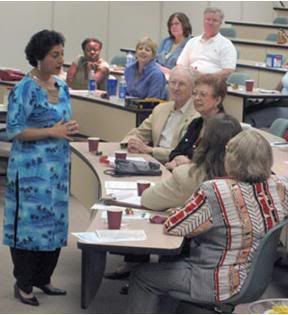 A woman working in a traditional Arab society in a field dominated by male must have been a big challenge. On this she says:
A woman working in a traditional Arab society in a field dominated by male must have been a big challenge. On this she says:
“As a Pakistani woman it is in some ways easier to work in Egypt than if I were otherwise. There is some challenge being a woman in what was a male dominated field, but on the whole it is not too difficult. In Egypt many women work in Egyptology and are not stopped in this path.”
She is also the founder and co-director of the Animal Mummy project at the Egyptian Museum in Cairo; she has emerged as one of the leading scholars in Egyptian funerary archaeology. Combining an interest in and understanding of the past with a passion of preserving it for the future, she has brought the little known world of animal mummies to light. Her series of books include a line of children’s books and three authoritative works – Divine Creatures, The Mummy in Ancient Egypt, and Death and Burial in Ancient Egypt. Her TV credits include Da Vinci Code: Decoded (Channel 4 UK), Tomb Raiders: Robbing the Dead (History Channel) and The Real Scorpion King (History Channel). However her animal mummy project is worth a special mention. She raised funds for safeguarding and analysing these animal mummies by encouraging Egyptians to adopt a mummy. She has been delighted by the response
I raised a good amount of money from the adopt-a-mummy project for the animal mummies. It helped fund the project which has now reached completion
In all, says Dr. Ikram, there were four kinds of animal mummies:
“sacred animals, which were worshiped; votive animals, given as offerings to the gods, sort of like votive candles; pets; and food offerings to provide food for eternity.”
Common household pets included cats, dogs, monkeys, gazelles and birds. X rays will help determine whether most pets were killed when their owners died or placed in their owners’ tombs after a natural death. X rays will also help determine the religious beliefs of ancient Egyptians. For example, there is considerable debate about the god Anubis, and whether ancient Egyptians most closely identified him with a dog, wolf, jackal or fox; X-raying Anubis’s votive mummies will reveal which animal the ancient Egyptians offered to him most often. Ikram also hopes that the Animal Mummy Project will shed light on the veterinary practices and mummification techniques of ancient Egyptians.
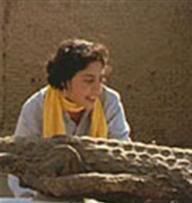 Ikram says controlled tourism and the education of tourists are key to
Ikram says controlled tourism and the education of tourists are key to
“preserving the heritage of ancient Egypt for posterity, as the increase in tourism, together with the rising population and its associated pollutants, are very destructive to antiquities all over the world.”
So what to expect next, what are the secrets they are trying to uncover now.
“We are working on a variety of projects that will help us learn about the Egyptian royal family and its interrelations, how technology was used in mummification where the Egyptians traded to obtain the materials for mummifying the dead, trying to find out routes that were being explored by the Egyptians as they plotted the continent of Africa, even details of daily life of the ancient Egyptiansâ€.
On the state of archaeology in Pakistan, her opinion was
“Archaeology in Pakistan is varied. Unfortunately there is less emphasis on excavations of the pre-Islamic period right now. Pakistan has an extremely rich cultural heritage from the Prehistoric (Neolithic and earlier) period onward. We need to work in a clear and scientific way to document all parts of our past so that we can trace our history to the present day. Unfortunately the temper of the times means that it is difficult to work in certain places and also that we cannot use our history not only to inform our citizens of our rich and varied past, but also cannot exploit it for tourism. In the future it would be wonderful if we could do bothâ€.
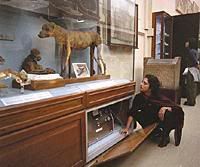 She is among a few Pakistani women who has gone far and beyond our traditional definitions and has made the country proud. She provides the following words to her fellow country women.
She is among a few Pakistani women who has gone far and beyond our traditional definitions and has made the country proud. She provides the following words to her fellow country women.
“If a Pakistani woman wants to do something, then she should. There is really nothing to stop her. From the time of my grandmother onward, women in my family have been following their very independent paths. One needs to be sure of what one wants and the way of pursuing that goal with the highest degree of professionalism.â€
Some of her books can be found here.


















































On the subject of archaeology, does anyone in Pakistan know about the Mohenjo daro necklace that was recently reported as being held by an Indian lady in Shimla?
Hey,
Could the author or someone else give me Dr.Ikram’s email or tell me how can i possibly reach her?
Her videos at youtube
http://www.youtube.com/results?search_query=salima +ikram&search_type=&aq=f
Dr. Salima Ikram is prominently quoted in the latest New Yorker magazine, 16 Nov 2009 issue, in an article, “The Pharaoh” about Zahi Hawass, the secretary-general of Egypt’s Supreme Council of Antiquities (S.C.A.).
Proud to be Pakistani, we have whole heck of a lot of brilliants people which world wouldn’t know, unfortunately they know us in the context of………..do not want to mention and boo to our media totally ignoring such an excellent people.
It is indeed a very well written article, worthy enough to keep passing on…….Not only an eye opener that Pakistan carries such a brilliant people but also very inspirational article.
Ayaz thank you! You might not know but it is a thought provoking article, conveyed a message to teens and parents that how to excel in life.